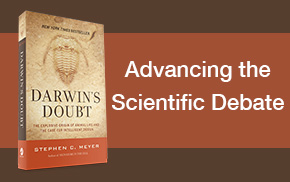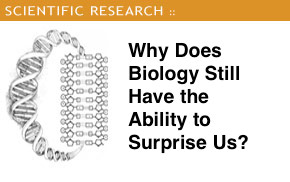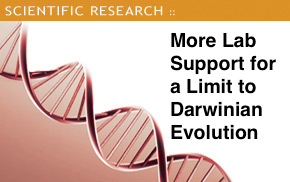Biological Information: How Do You Explain the Origin of Something That's So Tough Even to Define?

That's the implicit question raised by our friend and Baylor University electrical and computer engineering Distinguished Professor Robert Marks. Writing at Human Events, Marks describes the 2011 conference at Cornell that became the basis of a controversial collection of papers, Biological Information: New Perspectives -- see Casey Luskin's reporting on its tortuous road to publication. Writes Dr. Marks:
Most of these researchers [participating in the meeting], with Ph.D.'s from places like Cal Tech, UC Berkeley, Yale and Cornell, do not believe the traditional Darwinist explanation of natural selection of random mutations is adequate to explain the origin of biological information (in the DNA, for example), and many consider intelligent design as a possible source for this information.
Even though there are well-developed subareas of information theory in engineering dealing with communication and computer science, a scientific understanding of information is not well developed. We are unable to agree on some of the simplest of questions concerning information. If I shred a DVD, am I destroying information? What if there is a back-up copy? What if there isn't? If I take a digital picture with my cell phone, am I creating information? A poll of these questions will yield a variety of answers thereby revealing the muddiness of the definition of information. Yet we all agree that a picture of Mount Rushmore with the busts of four US Presidents contains more information than a picture of Mount Fuji. And a simple living bacterium contains more information than a like-sized speck of sand. Information can be etched on matter, like writing on a page, but information is not matter. Information can be coded onto energy like a wireless cell phone signal, but information is not energy. The founder of cybernetics, Norbert Weiner, summarizes: "Information is information. Neither matter nor energy." Since it is our uniform experience that elsewhere, information is only created by intelligent agents, many of the participants of the Cornell conference think that intelligent design is the only possible explanation for the vast amounts of information in biology also.
Information defies easy characterization, for Darwinists as for intelligent-design advocates. Yet the former are in denial of the basic enigma, while the latter's investigation fuels their thinking about what could potentially explain its origin, a vital question given that information underlies all of the study of biology:
Nobel Prize-winning biologist David Baltimore rightly said "Modern biology is a science of information." University of Texas philosopher of biology Sahotra Sarkar elaborates: "It is incumbent upon those who think that informational concepts have theoretical value in biology (that is, they explain things rather than being merely metaphors) to produce an appropriate technical concept of information for biological contexts." Moving towards these ends is the stated goal of Biological Information: New Perspectives. The Editors hope the volume will "inspire much hard work on the greater project of providing a full-fledged theory of biological information, one that is free of ideological bias and gets at the truth of the matter."
In his forthcoming book Being as Communion, William Dembski goes even further, arguing that information lies at the root not just of biology but all of material existence. Make sure you preorder Dembski's book, by the way, before you lose the opportunity to take advantage of the 34 percent pre-publication discount.
Meanwhile, another friend and email correspondent points out that commenters at Dr. Marks's article for Human Events have been raising absurd objections to the publication of Biological Information. What else is new? They tried to kill it once already, after all. Again, for the truth read the results of Casey's extensive research.
I'm on Twitter. Follow me @d_klinghoffer.







